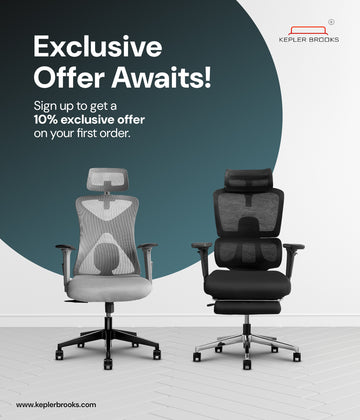

Trusted by 70,000+ customers
Bifma Standards Tested
Secure & Hassle-Free Returns
Doorstep Warranty Service
Sorry, there are no products in this collection

Join our community and be the first to know about offers, new collections and interior trends.

Sorry, the content of this store can't be seen by a younger audience. Come back when you're older.
What is Ergo Smart Chairs by Kepler Brooks?
Kepler Brooks brings in the best craftsmanship, technology & distinctive style which is committed to delivering products that enable you to energize your ideas and bring them to life. We create Ergo Smart Furniture, designed to keep every aspect of health in mind. Ergo Smart Chairs are specially made for working professionals who spend long hours at their desks. We strive for the highest standards and pledge to provide the best experience to our customers.
What is an Ergonomic Office Chair?
Ergonomics in furniture looks at the science of creating a design which can complement the human body and create a safe work environment for the human body.
An ergonomic chair, therefore, is one that aims to find a solution to the disorders, joint pains, fatigue and strains created by using a mediocre chair for prolonged periods. It is a chair designed to consider posture, back support, distribution of weight, comfort, adjustability and movement. An ergonomic office chair has multiple adjustable parts, so it is designed to uniquely fit every user and every user can sit comfortably at work.
Why do I need an ergonomic office chair? Is it worth the investment?
The most important and non-negotiable reason to buy an ergonomic chair is your health. Sitting at your desk all day and spending most of your time on the chair puts you at a high risk of developing a range of serious disorders like backache, neck pain, fatigue, muscle strain etc. It can lead to the development of musculoskeletal disorders, which affects your muscles, joints, tendons, ligaments, and nerves from the lack of upper back support. It can impact your posture, and causes pressure on your spine, backbone and rib area, leading to back pain. A perfect ergonomic chair conforms to your body shape, supports a proper posture, and keeps your joints and tissues in a neutral position. It allows for proper hip and pelvis alignment in your body which refrains from any form of stress. This lowers your risk of injury and strain, increases productivity and discards any discomfort you may feel in a mediocre chair.
Eventually, what you are gaining by investing in an ergonomic chair translates directly into your work.
We keep the below points in mind while designing a chair for any user -
Your Guide to buy an Ergonomic Chair -
When you purchase a chair for yourself, you should keep in mind that it affects your health in the long run. To stay fit when you sit, you need to have below mentioned pointers in your chair as a bare minimum functionality.
Adjustability
For every chair to be able to adapt to the unique user, it needs to be adjustable. An ergonomic chair blends which every unique user as per their body so that it can be adjusted easily by the user.
Seat height
Seat Height adjustability is a basic that every good ergonomic chair will have for the user to adjust the seat height from 15 to 22 inches off the floor. This range suits users between 5’ to 6’4” in height. At the proper height as per your body dynamics , your feet should be flat on the floor, with your knees perpendicular to the floor. This reduces any chance of stress on your knees and lumbar region. A chair with a hydraulic adjustment is ideal as you can correct the height sitting in the chair. The ability to modify the seat height of your office desk chair is essential to give you a comfortable seating experience during long hours.
Seat width
The baisc seat size is anywhere between 17 and 20 inches wide to provide ample space for the lower body and complement thigh support along with support to legs. Any user needs to be sitting comfortably on the seat, with at least 1 inch on either side of their hips to provide ample space for thigh support.
Seat depth
A perfect ergonomic office chair has the seat that is deep enough for the user to sit with their back against the backrest and provides a space for 2.5 to 4.5 fingers gap between the end of the chair and the user’s knees. At least 75% of the thigh needs to be supported by the seat of a good chair. Chairs with a seat sliding mechanism allows the user to slide the seat in and out while sitting in the chair and refrain from any stress on the lower body making the seating experience personalised and comfortable.
Lumbar support & Backrest
The presence of good adjustable lumbar support is a must to have point. The lumbar support your spine and equally distributes the upper body weight, including the neck and head. The chair’s adjustable backrest allows for proper truncal movement and protects your spinal cord. The concave curve of the backrest ( bulged in shape or s-shape ) helps to spread the weight distribution equally, and in turn, reduces the concentration of stress on your back. Sitting in a chair without lumbar support flattens that curve over a duration and leads to lower back pain and musculoskeletal disorders.
A good backrest should be anywhere between 12 to 19 inches wide. It needs to support the natural curve of the spine. It should promote dynamic seating rather than a static one to make the posture correct for user and generate increased blood flow. It should be able to recline (specifically between 100-135 degrees )and rock at any position the user wants and is comfortable with to absorb pressure in the lumbar discs to provide least pressure on the muscle activity of the user.
High back support: A high back support chair is suitable for tall people and those who prefer high back. It supports the complete back - from lower back to shoulders to head as it usually has a neck rest.
Medium back support: A medium back support chair is suitable for people with medium height. This height supports your shoulders and back. It does not support your head.
Low back support: A low back support chair is suitable for short people or those who prefer low back support chairs. The backrest of this type of chair is quite low in height and barely supports the shoulders and neck and head region.
Tension Tilt Control
The angle at which the backrest of the chair can be flexed is an important factor is choosing an ergonomic chair. The chair’s ability to provide tension tilt control meaning the ability to loosen or harden the tilt angle of the backrest is a must to have feature in your chair.
Armrests
The armrests need to be flexible and adjustable with soft padding on top for resting the arms on it. The ideal height of armrests is anywhere between 7” to 10” above the seat. The armrests should be soft, broad and comfortable for the users to allow proper rest to the elbows and forearms while working. The best to have armrests should be height adjustable and should move to and fro in forward and backward direction.
Movement and swivel with stability
The chair needs to be able to rotate and swivel 360 degrees easily so that its user can reach anything on their desk or adjacent to workspace without straining on their body. The chair should have movable wheels for the user to use the chair with mobility. A chair that allows free movement promotes a dynamic position and increases blood flow. A stable ergonomic office chair needs to have at least 5 spokes at the base with a metal/chrome/nylon base to make sure its durable to withstand the user weight. The wheels should be of top quality with the ability to move frictionless on the floor without making noise while movement.
Materials Used to make the chair
Frame - The frame of the chair needs to be either metal, nylon or wood depending on what type of chair it is. It needs to blend and complement the seat of the chair.
Foam - The foam used in the chair should be a minimum of 30D softy foam in order to give the long lasting seating experience which is comfortable for the user. The seat and backrest material should have enough padding for the user to feel comfortable for long working hours.
Hydraulic - The piston of the chair needs to be Class 4 in order to maximise the lifetime cycle for at least 10 years for a user to move it up and down as per the use.
Base - The base of a perfect chair should be either nylon, chrome or metal base.
Wheels - The wheels should be PU dual castor wheels to make it ergonomic.
